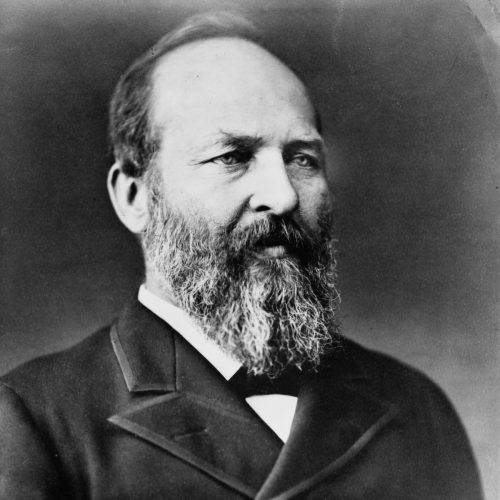With the election now behind us, it brings to mind the man I consider the most Christian President. Of course, no one can truly know a person’s heart, but by all indications, it would seem to be the man who was the only preacher to ever occupy the White House – James A. Garfield who served as 20th President for only a few months (Mar. 4 – Sept. 19, 1881) due to assassination.
He had been a major figure in the Restoration Movement (Christian churches & churches of Christ—the non-denominational fellowship which our church came from, seeking to restore New Testament Christianity). In fact, that would make him the first non-denominational Christian President (Lyndon Johnson & Ronald Reagan also had affiliations with this Movement). In order to take office, he had to give up preaching as an elder, saying: “I resign the highest office in the land to become President of the United States.”
Born into a poor Christian family near Cleveland, Ohio, and raised in a Christian church, at age 19, he noted in his diary he was “determined to obey the gospel.” During revival meetings that week, he surrendered to Christ & was baptized in one of the icy Chagrin River tributaries. That night he again wrote: “Today I was ‘buried with Christ in Baptism and arose to walk in newness of life.’ For as many as have been baptized into Christ have put on Christ.”
He went to the Christian Church (Disciples of Christ) college nearby, & developed the ability to preach. He later attended college in Massachusetts, where he often preached for small Restoration Movement churches. It was said that people listened intently to his messages & assumed he’d go into ministry, but he developed an interest in politics. He wasn’t a full-time church leader but primarily preached at revivals, married people, & spoke at funerals.
He then taught & was made college president at his alma mater. He was laying the groundwork for a political career, still, he was invited to preach somewhere nearly every Sunday & in many extended meetings. One of those meetings resulted in 34 baptisms & another in 20.
He won election to the Ohio Senate in 1859, then the Civil War broke out. He accepted command of a regiment, quickly rose through the ranks, fought bravely, & eventually attained the rank of major general. He was elected to the U.S. House of Representatives in 1863, where he served for nearly two decades. As a member of Lincoln’s new Republican Party, he was a strong advocate for abolition, civil rights for black people, & education for all. He also took a very risky stance against government corruption.
In 1866 Garfield became part of the founding & financing of the new weekly periodical for the Restoration Movement called the “Christian Standard,” which is still in existence. He served on the board of trustees for 2 Restoration Movement colleges because he believed deeply in the same doctrines that we do here.
While in Washington, D.C., he faithfully attended Vermont Avenue Christian Church where he occasionally taught Sunday School, & helped raise money to purchase a simple building (the press ridiculed it as a “shanty”). It was there that later a special worship service was held 2 days after his inauguration.
Garfield never sought the presidency, but his party drafted him as a compromise dark horse candidate in 1880—winning by the narrowest of margins. Many sent him congratulatory letters after being elected, but one stands out from Burke Hinsdale who wrote: “I have been astonished…at the hold that your candidacy took of the religious mind of the country. ‘Now we are going to have a religious man for president’ is a thought that has swelled in the hearts of thousands of religious men.”
The first week after his inauguration, a member of his cabinet insisted on an urgent meeting on Sunday morning at 10:00 to handle a threatened national crisis. Garfield refused because he had a more important appointment. What could be so important? He said, “My engagement is with the Lord to meet Him in His house at His table at 10:00 tomorrow, and I shall be there.”
His short time in office was marred by political strife & factionalism within his party. But his life & legacy present a great example of both taking strong stands for what is morally right while also seeking unity in the face of division, which American Christians could use in these divisive days.
He was cut down by a disgruntled & deranged office seeker who shot him twice in a railway station on July 2, 1881. He survived but lived in misery, succumbing to infections & complications from his wounds on Sept. 19, just shy of his 50th birthday. His assassination shocked the nation. On the day of his public funeral, the new President Chester A. Arthur called for a national day of fasting & prayer throughout the land.
Garfield said: “Now, more than ever before, the people are responsible for the character of their Congress. If that body be ignorant, reckless, & corrupt, it is because the people tolerate ignorance, recklessness, and corruption. If it be intelligent, brave, & pure, it is because the people demand these high qualities to represent them in the national legislature. If the next centennial does not find us a great nation…it will be because those who represent the enterprise, the culture, and the morality of the nation do not aid in controlling the political forces.”


